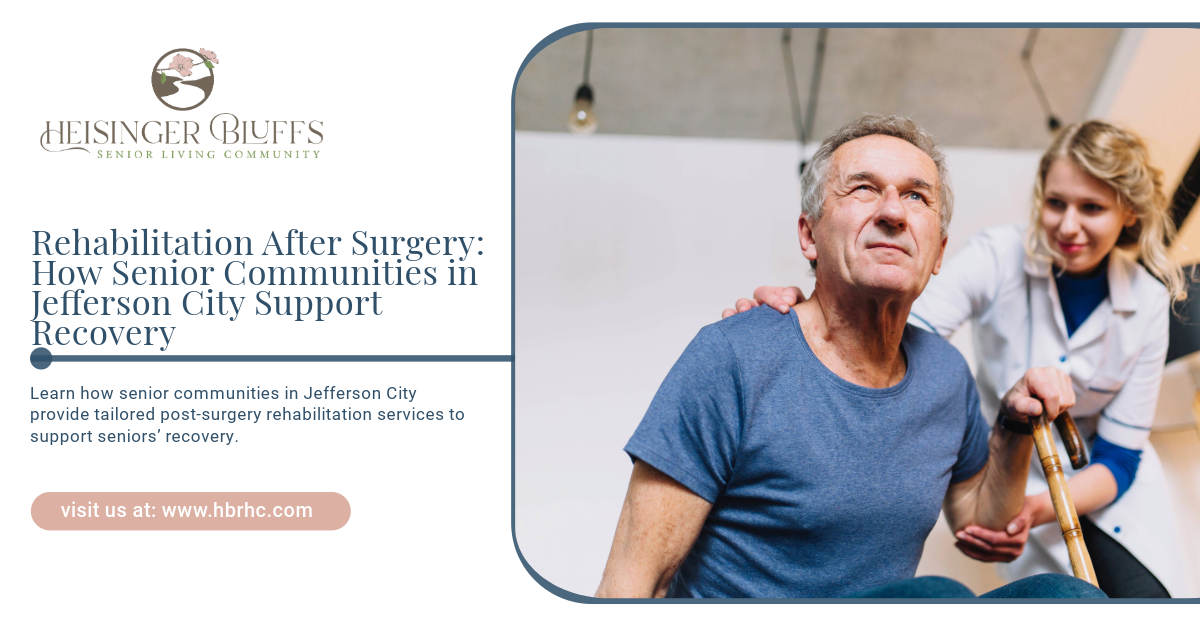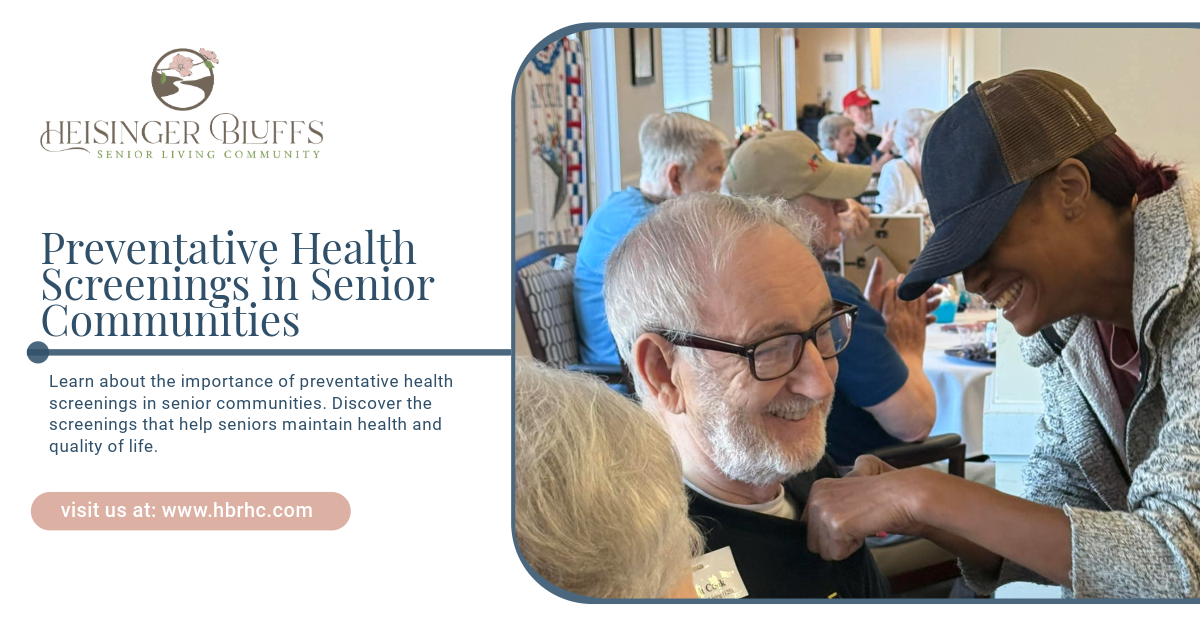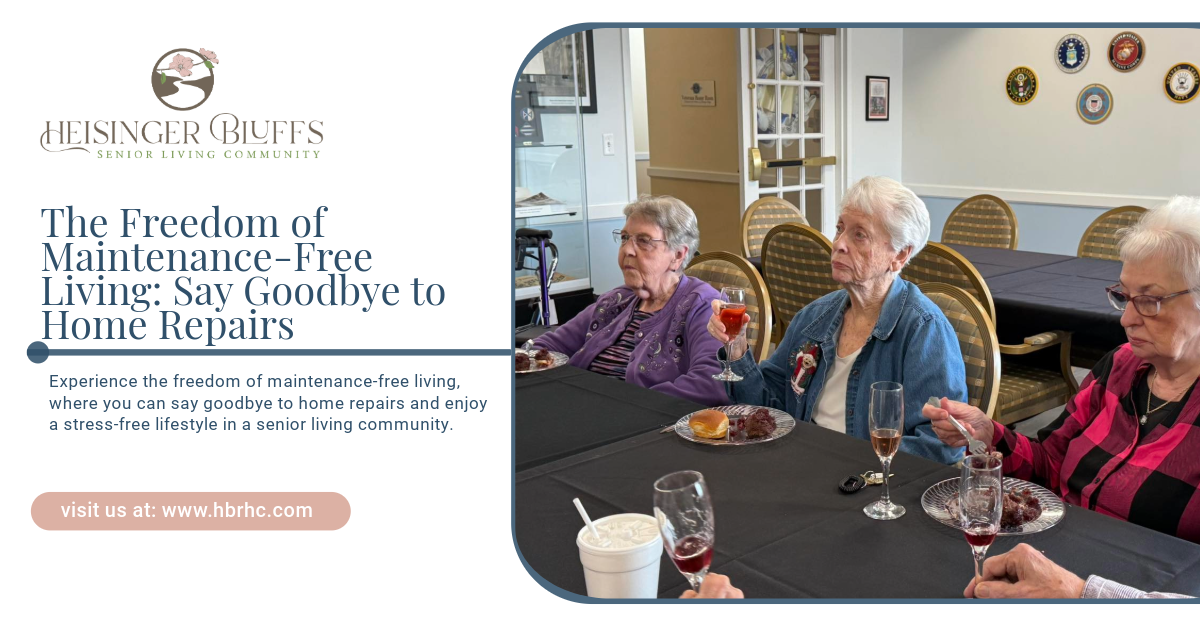Rehabilitation After Surgery: How Senior Communities in Jefferson City Support Recovery

For seniors undergoing surgery, the recovery process often requires specialized care and a comprehensive rehabilitation plan. Senior communities in Jefferson City offer tailored post-surgical rehabilitation services to ensure older adults regain strength, mobility, and independence. Rehabilitation after surgery can be challenging for seniors, and proper care is essential for minimizing complications, promoting healing, and enhancing overall quality of life.
In this blog, we’ll explore how senior communities provide comprehensive rehabilitation after surgery, the types of services available, and how these communities offer a supportive environment for seniors in recovery.
Why Rehabilitation Is Essential After Surgery
The recovery process after surgery can be complex, especially for older adults. Whether it's a hip replacement, knee surgery, or another procedure, seniors often require assistance to rebuild their strength and mobility. Post-surgery rehabilitation is designed to address several important aspects of recovery, including:
- Restoring mobility: After surgery, many seniors struggle with movement due to pain, stiffness, or weakness. Physical therapy plays a crucial role in helping them regain mobility.
- Pain management: Proper rehabilitation helps manage post-surgical pain through targeted exercises, modalities, and medications.
- Preventing complications: Without adequate rehabilitation, seniors are at risk of developing complications such as blood clots, infections, or further injury.
- Regaining independence: Many seniors experience difficulty performing daily activities post-surgery. Rehabilitation can help them rebuild the skills they need for daily living.
Senior communities in Jefferson City offer tailored rehabilitation programs designed to meet the unique needs of each individual, ensuring they receive the support they need to recover successfully.
Tailored Rehabilitation Plans for Seniors
One of the key benefits of senior living communities in Jefferson City is the ability to provide personalized rehabilitation plans. Every senior is different, and so are their recovery needs. Factors such as the type of surgery, pre-existing health conditions, and the individual's physical abilities are all considered when creating a rehabilitation plan.
1. Initial Assessment and Goal Setting
The rehabilitation process typically begins with a comprehensive assessment conducted by healthcare professionals, including physical therapists, occupational therapists, and nurses. This initial assessment allows the care team to:
- Understand the senior's medical history and current health condition.
- Evaluate their physical abilities, pain levels, and mobility limitations.
- Set realistic, personalized recovery goals that focus on improving functional abilities and overall quality of life.
Setting goals helps seniors stay motivated throughout the rehabilitation process. These goals might include improving walking ability, reducing pain, or regaining the ability to perform self-care activities like bathing and dressing.
2. Physical Therapy
Physical therapy is often the cornerstone of post-surgery rehabilitation for seniors. It involves exercises and treatments designed to improve strength, flexibility, and balance, which are essential for a successful recovery.
Key components of physical therapy in senior communities include:
- Strength training: Targeted exercises help rebuild muscle strength, which is often weakened after surgery. This is especially important for seniors recovering from joint replacements or fractures.
- Range-of-motion exercises: These exercises help seniors improve flexibility in the affected area, such as the hips, knees, or shoulders. Increasing the range of motion helps prevent stiffness and promotes mobility.
- Balance training: Falls are a major concern for seniors during recovery. Physical therapists work with individuals to improve their balance and stability, reducing the risk of falls.
- Pain management techniques: Physical therapy includes techniques like ice and heat therapy, massage, and electrical stimulation to help manage post-surgical pain.
By focusing on these areas, physical therapy can help seniors regain independence, restore mobility, and return to their normal daily activities.
3. Occupational Therapy
While physical therapy focuses on strength and mobility, occupational therapy addresses the skills needed for everyday tasks. After surgery, many seniors face challenges with basic activities such as dressing, bathing, cooking, or getting in and out of bed.
Occupational therapists work with seniors to:
- Improve fine motor skills: Therapy includes exercises that strengthen hand movements and coordination, which are necessary for tasks like buttoning clothes or using utensils.
- Adapt daily routines: Therapists teach seniors how to modify their daily routines to accommodate any physical limitations during recovery.
- Use assistive devices: Seniors may need assistive devices such as walkers, canes, or grab bars after surgery. Occupational therapists provide training on how to use these devices safely and effectively.
- Home safety modifications: For seniors returning home after rehabilitation, therapists offer recommendations on home modifications to make their environment safer and more accessible. This can include installing handrails or removing tripping hazards.
The goal of occupational therapy is to ensure that seniors can safely and independently perform daily activities, promoting a smoother transition back to everyday life after surgery.
Comprehensive Support from Trained Therapists
Senior communities in Jefferson City that offer rehabilitation services provide comprehensive support from trained professionals. The rehabilitation team may include:
- Physical therapists: These specialists guide seniors through targeted exercises and treatments to restore mobility and strength.
- Occupational therapists: They focus on helping seniors regain independence in daily activities.
- Speech therapists: For seniors who have experienced surgery affecting their ability to speak or swallow, speech therapy can help improve communication and swallowing function.
- Certified nursing assistants (CNAs): CNAs provide hands-on support with activities of daily living, such as bathing, dressing, and eating.
- Nurses: Skilled nursing care is available to monitor post-surgical recovery, manage medications, and provide wound care if necessary.
The interdisciplinary approach ensures that all aspects of a senior’s recovery are addressed, from physical rehabilitation to emotional well-being. Seniors benefit from the combined expertise of professionals working together to create a cohesive recovery plan.
Pain Management and Medication Monitoring
After surgery, effective pain management is essential for a smooth recovery. Senior communities in Jefferson City employ pain management strategies that prioritize both comfort and safety. Pain management in these communities may include:
- Medications: Doctors prescribe appropriate pain-relief medications, and nursing staff monitor dosages and timing to ensure seniors are comfortable without risking overmedication.
- Non-pharmaceutical approaches: Alongside medications, physical therapists may use techniques such as ice and heat therapy, massage, and relaxation techniques to reduce pain.
- Monitoring side effects: Seniors are more susceptible to medication side effects, especially if they are taking multiple medications for other health conditions. The healthcare team monitors any side effects to prevent complications during recovery.
Medication management is also a critical component of rehabilitation, as seniors often require multiple prescriptions during the recovery phase. Nurses and pharmacists work together to ensure that all medications are administered safely and that any drug interactions are avoided.
Emotional and Psychological Support During Recovery
Surgery and the rehabilitation process can be emotionally taxing for seniors. Feelings of anxiety, frustration, or depression are common during recovery, especially if the individual is unable to return to their previous level of independence as quickly as they had hoped.
Senior communities provide emotional and psychological support during rehabilitation through:
- Counseling services: Access to counseling or therapy helps seniors cope with the emotional challenges of recovery. Talking with a mental health professional can ease feelings of stress and promote a positive outlook on the recovery process.
- Social interaction: Being part of a senior community means that residents have opportunities for social interaction, which can help combat feelings of isolation. Whether through group activities, social events, or dining with other residents, seniors have a sense of community that enhances emotional well-being.
- Family involvement: Senior communities often encourage family involvement in the rehabilitation process. Family members can visit regularly, attend therapy sessions, and offer emotional support throughout recovery.
By addressing the emotional needs of seniors during recovery, senior communities help foster a positive healing environment that improves both physical and psychological outcomes.
Nutrition and Diet During Rehabilitation
Proper nutrition plays a crucial role in the healing process after surgery. Senior communities in Jefferson City offer personalized meal plans designed to meet the specific dietary needs of seniors recovering from surgery. Nutrition services may include:
- Customized meal plans: Dietitians work with seniors to create meals that support healing, address dietary restrictions, and promote overall health.
- Nutrient-rich foods: Seniors are provided with balanced meals that include essential nutrients like protein, vitamins, and minerals to support tissue repair and boost the immune system.
- Monitoring for special conditions: For seniors with diabetes, heart disease, or other chronic conditions, specialized diets are created to manage their health while promoting recovery.
Proper nutrition not only speeds up the healing process but also helps prevent complications like infections or slow wound healing.
Transitioning Back to Everyday Life
Rehabilitation doesn’t end when therapy sessions are over. Senior communities help individuals make a smooth transition back to their daily lives through comprehensive discharge planning and ongoing support. This may include:
- Home assessments: For seniors returning home, occupational therapists can conduct home assessments to ensure their environment is safe and accessible.
- Follow-up care: Many communities provide follow-up care after discharge, including outpatient therapy or home health services.
- Ongoing wellness programs: To maintain their progress, seniors can participate in wellness programs offered by senior communities, such as fitness classes, social activities, and wellness check-ins.
By focusing on the long-term success of each individual, senior communities ensure that seniors continue to thrive even after their rehabilitation program is complete.
Conclusion
Post-surgery rehabilitation is a critical step in helping seniors recover and regain their independence. Senior communities in Jefferson City provide a range of tailored rehabilitation services, including physical and occupational therapy, pain management, emotional support, and personalized nutrition plans. These services, combined with skilled professionals and a supportive environment, ensure that seniors receive the care they need to make a full and successful recovery.
At Heisinger Bluffs, we are committed to offering comprehensive rehabilitation services that promote healing and improve quality of life for seniors after surgery. If you or your loved one are in need of post-surgery rehabilitation, contact us today to learn how we can support your recovery journey.











